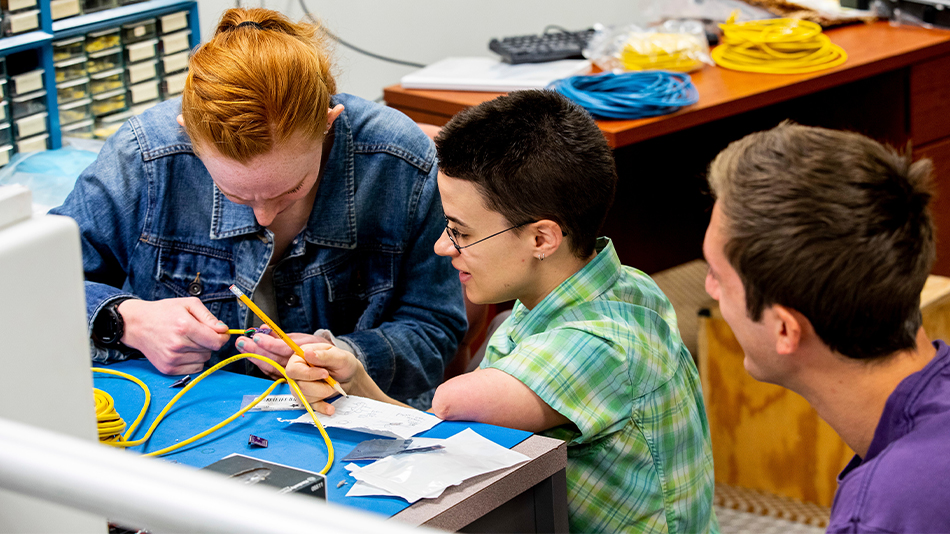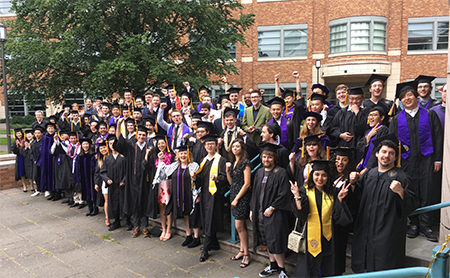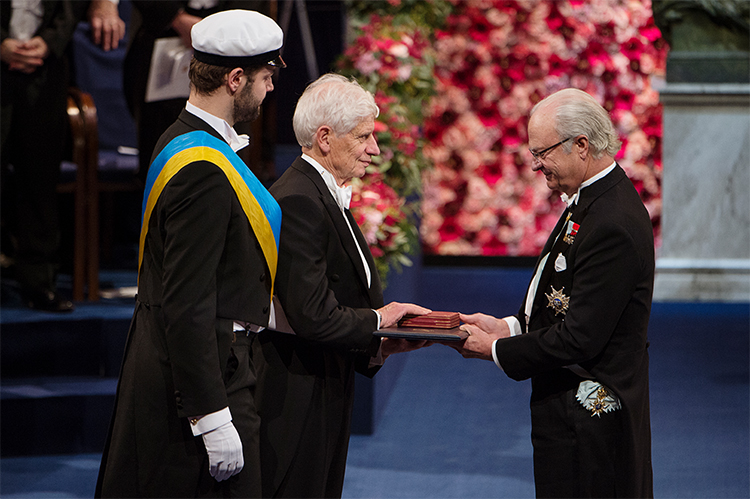
Physics is the study of the behavior of matter, space, time, and fields. Using highly sophisticated experimental and mathematical techniques, physicists gather detailed measurements of phenomena — from the largest scales involving the entire universe to the smallest scales involving the most fundamental particles — to construct theories that explain how the universe and the things in it behave.
VISIT DEPARTMENT WEBSITE304
Undergraduate majors
EDUCATION
The Department of Physics educates students at all levels from general education, through preparation for teaching and scientific careers, to doctoral and post-doctoral education. The department encourages the involvement of undergraduates in research; currently more than 180 undergraduates participate in research within the department.

Students
Winter 2026
- 304 Undergraduate majors
- 53 Master’s students
- 133 PhD students
Degrees Awarded
2024-25
- 94 Bachelor of Science degrees
- 51 Master of Science degrees
- 26 PhD degrees
Student Awards
Since 2022
- 3 ARCS Awards
- 9 NSF Fellowships
- 1 Fulbright Fellowship
- 1 Perimeter Institute Fellowship
- 4 National Defense Science and Engineering Fellowship
RESEARCH
Subjects of current interest to physicists range from the behavior of the universe at the earliest times and largest distances, to the collective behavior of large numbers of particles, the properties of nuclei and their constituents, and the fundamental nature of space, time, gravity and other interactions.
Current work includes studies of properties of diverse forms of matter, quantum information and entanglement, quantum simulation and sensing, searches for dark matter or other new particles, physics of living systems, and many other areas. Research highlights include:
- hosting the Axion Dark Matter eXperiment (ADMX), is a world-leading dark matter search experiment;
- classification and study of states of matter with unique topological properties;
- quantum dynamics and quantum simulation;
- formation and study of atomically thin layered materials which exhibit diverse properties and may form the basis for new quantum information devices;
- leading roles in the KATRIN and MAJORANA neutrino experiments;
- studies of the period in the early universe when the earliest stars and galaxies first lit up;
- major roles in the muon g-2 experiment at Fermilab and in ATLAS and novel future experiments at the Large Hadron Collider at CERN;
- studies of duality in string theory and quantum field theory;
- calculations of hadronic and nuclear properties; and
- statistical physics of biological systems.

Areas of Research
- Astrophysics and Dark Matter
- Atomic Physics
- Biological Physics
- Condensed Matter Experiment
- Condensed Matter Theory
- Elementary Particle Experiment
- Elementary Particle Theory
- Gravitational Physics
- Nuclear Experiment
- Nuclear Theory
- Physics Education
- Quantum Information
FACULTY
The Department of Physics has 61 faculty — 55 research active and 6 who anchor the instructional programs of the department. They include:
- 35 Professors
- 6 Associate Professors
- 7 Assistant Professors
- 1 Research Professor
- 6 Research Assistant Professors
- 1 Teaching Professor
- 4 Associate Teaching Professors
- 1 Assistant Teaching Professor
The department is also home to 47 Postdoctoral Scholars.
Faculty and emeritus faculty honors
Since 2016
- 1 Nobel Prize (David Thouless)
- 1 New Horizons Prize
- 5 Breakthrough Prize recipients
- 1 Presidential Early Career Award
- 1 Packard Fellow
- 1 Kavli Fellow
- 3 Sloan Fellows
- 1 American Physical Society Bonner Prize
- 2 American Physical Society Feshbach Prizes
- 1 American Physical Society Freedman Award
- 1 American Physical Society Panofsky Prize
OUTREACH
The Physics Education Group has been involved for 30 years in programs to help pre-service and in-service physics teachers understand physics and how to help students deal with the concepts. Multiple faculty and students are involved in sharing physics with local K-12 schools and community organizations.
CONTACT
Department of Physics
Box 351560
University of Washington
Seattle, WA 98195
(206) 543-2770
phys.washington.edu
last update: January 2026